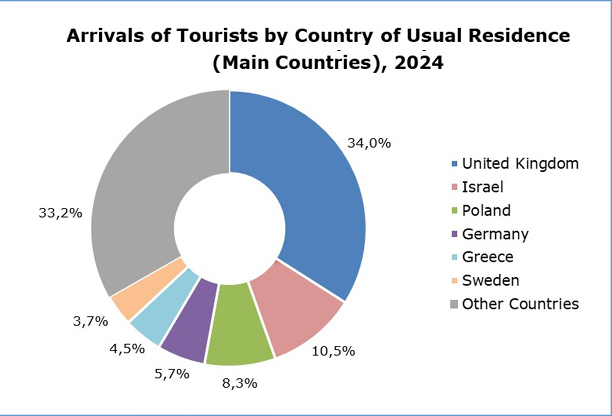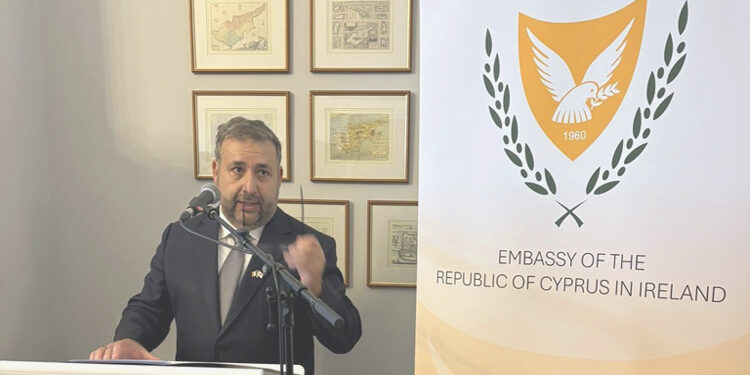by Miceál O’Hurley
NICOSIA — Having just celebrated its 65th Anniversary of Independence Cyprus continues to move from strength to strength. In the aftermath of the peace process unfolding in Gaza, US President Trump, who will head the Board of Peace envisaged by his 20-point Peace Plan, has personally invited both Cyprus and Greece to participate in future high-level negotiations for the future of Gaza and peace in the Middle East. Trump’s invitation to President Nikos Christodoulides is a recognition of the outsized role played by Cyprus in regional politics.
This year, His Excellency Mr. Louis Telemachou, Ambassador of Cyprus to Ireland, kicked-off the annual Independence Day celebrations at the Embassy in Dublin. Speaking to a packed room, Ambassador Telemachou paid homage to the Cypriots who have guided the country since its independence from Great Britain in 1960, acknowledging the retired members of the Irish Defense Forces in the room, many of whom served as UN peacekeepers in Cyprus over the years. The event’s master of ceremonies, Dimitris Filippou, a young Cypriot studying economics at Trinity College Dublin provided his own remarks highlighting his pride in being both a European and Cypriot. Teachta Dala Ruairí Ó Murchú, Convenor of the Ireland–Cyprus Parliamentary Friendship Group in Dáil Éireann, addressed the assembled guest of diplomats, parliamentarians and dignitaries.
Just over 1.36m people live on Cyprus. Its capital, Nicosia, is only 30-minutes flight from key Middle Eastern capitals in Egypt, Jordan, Israel, Lebanon and Syria. Its position as a regional player for peace and stability is long-standing.
Since achieving independence from Great Britain in 1960, Cyprus has continued along a path of impressive international and domestic development. Only 4-years after independence, a United Nations Peacekeeping Force in Cyprus (UNFICYP) was erected by United Nations Security Council Resolution 186 in 1964. UNFICYP was established to prevent the re-occurrence of violent conflicts that had arisen between Greek Cypriots and Turkish Cypriots. In July 1974, a coup d’etat by Greek Nationalists resulted in Türkiye sending forces to Cyprus claiming a responsibility to protect Turkish Cypriots. The conflict eventually led to a virtual division of the small Mediterranean island. In 1983, a unilateral declaration by the unrecognised Turkish Republic of Northern Cyprus proclaimed its de facto independence. Türkiye remains the only country to recognize this claim. The current UN mandate for the UNFICYP mission expires in January 2026. It is expected to be renewed.
Along with Ireland, Cyprus is the only other EU Member State to be plagued by partition. After nearly 60-years of division, the estrangement between Greek Cypriots and Turkish Cypriots has grown culturally, economically and socially. Cyprus boasts a diverse and inclusive community including Armenians, Maronites and Latins that live without conflict. Northern Cyprus remains almost monolithically Turkish in ethnic background and orientation.
If partition has served to be a thorn in Cyprus’ side it stands askew by its social, political and economic achievements. Since 1960, Cyprus has generally outperformed EU markets as well as annual projections generally achieving full-employment and economic stability. Following the world-wide economic downturn in the early 2010s, Cyprus undertook aggressive reform initiatives and returned to economic growth in 2015. Cyprus’ recovery occurred well ahead of most European partners. The Cypriot Government’s better-than-expected performance in managing their share of the worldwide economic crisis led to them declining to draw-down some €2.7bn in pledged European Stability Mechanism (ESM) funding. In 2024, the latest year for which statistics are available, Cypriot real GDP reached 3.4% – well outperforming the Euro area average. The labor participation rate in Cyprus during the same period at 79.9% was only exceeding in the EU by Norway at 80.4%. Cyprus has continued to solidify its positive economic outlook by continuing its decline of debt-to-GDP ratio.
Primarily a service-based economy, oil and gas resources, tourism, shipping and trade continue to drive the economy. Over the last decade, Cyprus’ Telecommunications and Technology sector has thrived. Cyprus’ investment in every home having access to 5G and high-speed fiber optics networks, improving underseas cables and redundant satellite access has positioned the island nation as a regional hub for continued development and growth. Subsector growth in fintech, healthtech, proptech, cybersecurity, and blockchain initiatives have positioned the Telecommunications and Technology sector as Cyprus’ fastest growing sector.
Education, professional labour force skills development, the necessity for further reform to bolster public-sector confidence and EU skepticism remain features of the Cypriot economy that demand attention.
Cyprus has not gone without attracting criticism. In 2024, a handful of members of the Parliamentary Assembly of the Council of Europe (PACE) decried Cyprus’ role as a supposed haven for Russian money and sanctions avoidance schemes. President Christodoulides rebuffed such criticism, accurately countering such accusations that Russian deposits in Cypriot banks had fallen by 76% since Russia’s initial invasion of Ukraine in 2014. Between 2014-2022, the number of Russian clients using Cypriot banks dropped by 82%. Today, Cyprus remains a leader within the EU in countering Russian attempts to skirt sanctions and access European and world markets. Cyprus has stood in solidarity with Ukraine since the first days of the Russian invasion in 2014.

Despite a fully diversified economy with an adequately capitalised and profitable financial sector, traditional service industry sub-sectors account for almost 80% of its GDP. Tourism now accounts for in excess of 4 million visitors to the island annually. According to Government statistics, revenue from tourism in 2024 was estimated at €3,2m, compared to €2.9m in 2023, marking an increase of 7,3%. Airlines remain the primary access to Cyprus although ferry service is available from neighbouring Greece and Türkiye.
Maritime related activities led by the shipping sector. also represent a stalwart of the Cypriot economy. Approximately 55,000 seafarers serve on Cyprus flagged seagoing vessels. Beyond fleet size and capacity, Cyprus boasts its position as the leading third-party ship management centre in Europe. Its shipping and maritime sector success is owed to its early modernisation efforts after independence that continues to pay market dividends.
Over the last 2-years, the Cyprus Ship Registry has increased by 20% in terms of gross tonnage, reaching its highest point of the last 20 years. Equally as impressive, the number of companies registered in the Cyprus Tonnage Tax System realised a 15% increase. Between 2023-2024, Cyprus’ ship management sector’s contribution to GDP rose by an overall 27%. The catalyst for such growth was, in part, was the creation of the 2010 Cyprus Shipping Taxation System. Introduced in cooperation with the EU, it has ensured Cyprus sustains a beneficial taxation system that in effect serves as the only “EU approved open registry” that extends benefits to foreign ship operators.
Cyprus’ Presidency of the Council of the European Union (EU) will commence in 2026. President Christodoulides highlighted Cyprus’ readiness to engage in the traditional issues of importance to the EU such as the Multiannual Financial Framework (MFF), Europe’s cohesion policy, agriculture policy and other topics. Speaking to the President of the European Council, Antonio Costa upon his recent visit to Cyprus in September, President Christodoulides highlighted Cyprus’ leadership capacity in encouraging Europe to “… reflect our new priorities – competitiveness, security and defence, migration”. Tipping his hat to Cyprus and noting its role as a traditional bridge to the Middle East, President Costa replied, “We count on you to put in motion our priorities: competitiveness, security, and engaging more with the region. The Middle East is a critical point for the world, and we need to work for peace, for stability, and for prosperity in the Mediterranean”.
















































